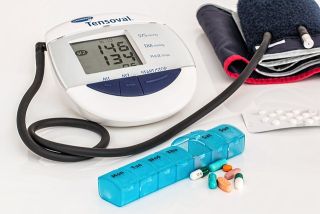Depression
Why Mental and Medical Illnesses Co-Occur
Bidirectional feedback loops can keep illnesses instigating one another.
Posted May 14, 2024 Reviewed by Michelle Quirk
Key points
- Mental illness and physical illness have a high rate of co-occurrence.
- The relationship of mental and physical illness tends to be bi-directional.
- Therapists should ask about physical complaints and assess if they are exacerbating patients' presentations.

Mental illness and physical illnesses uncannily co-occur. It’s not uncommon to read that, say, depression places one at risk for hypertension (e.g., Rubio-Guerra, 2013) or that pain conditions heighten the risk of co-occurring depression (e.g., Goodwin, 2006). In these cases, everyone, of course, wants to know if it is the chicken or the egg, or if the physical ills are somehow a symptom of, in this case, the depression.
The answer is, “It depends.”
Medical mimicry
First, however, the above isn’t the same as an underlying medical illness mimicking a psychiatric disorder, as addressed in this post on medical mimicry. In those cases, sticking with the example of mood disorders, hypothyroidism, for example, can be a mirror image of a type of chronic depression called dysthymia. Despite no depression-instigating life issues or family history of depression, the person seems like Eeyore—unexcitable, lethargic, and always traveling with a gray cloud over them. Someone with a hyperthyroid could seem to have a bipolar spectrum illness called cyclothymia. This looks like some days of restlessness, irritable or excitatory mood, and less need for sleep, cycling with a few days of a few depressive symptoms.
These possibilities are why it is so important that a physical evaluation take place to rule out underlying medical conditions causing peoples’ symptoms, especially if they abruptly occur and/or there is no family history or instigating event.
Comorbid medical and mental illness
Regarding the co-occurrence of psychogenic mental illness and physical diseases, however, there is a more bidirectional matter. This is because one may instigate the other, and then they feed off of one another. Take, for instance, someone with generalized anxiety disorder (GAD), which is essentially pathological worrying. They always think of the worst-case scenario and, given this, have poor sleep, are restless/fidgety, can’t think clearly, and can be irritable—a very stressful experience!
Poor sleep alone can wreak physical havoc. Insomnia is correlated with an increased risk of metabolic diseases like diabetes and obesity, along with a higher risk of infections (Caldwell, n.d.). The poor sleep inherent to GAD ends up exacerbating the principal symptoms. Being tired and irritable is stressful, and stress is fertile ground for worry about performance in school, work, and relationships. Further, stress is sure to further exacerbate insomnia. Given people with GAD tend to worry about anything, feeling physically drained can initiate worry about physical health. It is easy to see the deconstructive symbiosis here.
To add to all of this, given worry is a stressor, and the worry is invariably present, that means the body is releasing the stress hormone cortisol. Chances are, even on good days it’s flowing more than what’s desirable. On bad days, it’s spiking and flooding the body. While cortisol is essential for survival in that it makes people more alert, quick-thinking, and ready to run or fight, being consistently bathed in it causes inflammation.
Inflammation is believed to considerably contribute to autoimmune digestive problems like Crohn’s disease and ulcerative colitis (Yu et al., 2023), arthritis (Goldman, 2021), and cardiovascular disease (Zhang et al., 2022). Some researchers have found that people with anxiety disorders are more commonly in the active phase of inflammatory disease (e.g., Byrne et al., 2017). Readers interested in more detail about the effects of inflammation might enjoy perusing articles by researchers Vogelzangs et al. (2013) or Yu et al. (2023). Further, there is an exceptional amount of research on the gut-to-brain connection that also surely plays a role. This article by Mitrea et al. (2022) is a good, updated introduction.
Clinical practice implications
The above considered, it makes sense, then, that mental health evaluators ask about physical symptoms. While they may not be MDs, this does not mean that it cannot be broached. It is only unethical if they were to perform a physical examination or provide medical advice. In fact, it might be considered unethical if a mental health provider did not ask about physical health, as it could inform required interventions. Someone with a history of an inflammatory disease who seeks treatment for mental illness but is no longer in treatment for the inflammatory disease is likely psychologically suffering more than need be.

Thus, mental health professionals are never remiss in collaborating with primary care doctors or specialists to help control physical ailment(s). Given the bidirectional relationship between it and the psychological distress, if the physical disease is controlled, it can dampen the acuity of the mental health struggle, bringing about more rapid improvement. Of course, helping someone get stable is often easier than maintaining it. Therefore, it is important for therapists, once the psychological suffering remits and the physical ailment is well managed or in remission, to work with the patient to maintain a lifestyle that will not invite the physical disease to return. This often includes sleep hygiene and stress management, further collaborating perhaps with dieticians and exercise coaches to refine healthier lifestyle habits.
Alternatively, someone might have a serious medical illness that lends itself to depression or anxiety-provoking circumstances. Here, the psychological distress developed because of the stress of the physical illness. Provided mental stress encourages inflammation, which can cause/exacerbate the principal medical illness, doctors might refer patients to psychotherapy/psychiatry to quell the psychogenic symptoms.
Given many of the people we encounter in mental health settings have chronic/acute conditions, it might be safe to assume there are inflammatory furnaces burning that will continue to heat up if there is no intervention. Clearly, paying attention to psychotherapy patients’ physical ailments can have a profound effect on their mental/behavioral health and, thus, general functioning.
Disclaimer: The material provided in this post is for informational purposes only and is not intended to diagnose, treat, or prevent any illness in readers or people they know. The information should not replace personalized care or intervention from an individual's provider or formal supervision if you're a practitioner or student.
References
Byrne, G., Rosenfeld, G., Leung, Y., Qian, H., Raudzus, J., Nunez, C., & Bressler, B. (2017). Prevalence of anxiety and depression in patients with inflammatory bowel disease. Canadian Journal of Gastroenterology and Hepatology, 2017. https://doi.org/10.1155/2017/6496727
Caldwell, A. (n.d.). How sleep affects human health, explained. University of Chicago News, Explainer Series.
Goldman, H. (2021, July 1). Chronic inflammation and your joints. Harvard Health.
Goodwin, G.M. (2006). Depression and associated physical diseases and symptoms. Dialogues in Clinical Neuroscience, 8(2), 259–265. doi: 10.31887/DCNS.2006.8.2/mgoodwin.
Mitrea, L., Nemeş, S.-A., Szabo, K., Teleky, B.-E., and Vodnar, D.-C (2022) Guts imbalance imbalances the brain: A review of gut microbiota association with neurological and psychiatric disorders. Frontiers in Medicine, 9:813204. doi: 10.3389/fmed.2022.813204
Rubio-Guerra, A.F., Rodriguez-Lopez, L., Vargas-Ayala, G., Huerta-Ramirez, S., Serna, D.C., & Lozano-Nuevo, J.J. (2013). Depression increases the risk for uncontrolled hypertension. Experimental Clinical Cardiology, 18(1), 10–12. PMID: 24294029.
Vogelzangs, N., Beekman, A., de Jonge, P. & Penninx, B.W.J.H. (2013). Anxiety disorders and inflammation in a large adult cohort. Translational Psychiatry, 3(e249). https://doi.org/10.1038/tp.2013.27
Yu, R., Liu, C., Zhang, J., Li, J., Tian, S., Ding, F., Liu, Z., Wang, T., Liu, Z., Jiang, C., Shi, J., Wu, K., & Dong, W. (2023). Correlation analysis between disease activity and anxiety, depression, sleep disturbance, and quality of life in patients with inflammatory bowel disease. Nature and Science of Sleep, 15, 407–421. https://doi.org/10.2147/NSS.S407388




